Gadhafi calls for greater democracy at U.N.
By Richard B. Muhammad and Brian E. Muhammad | Last updated: Oct 1, 2009 - 9:41:48 AMWhat's your opinion on this article?
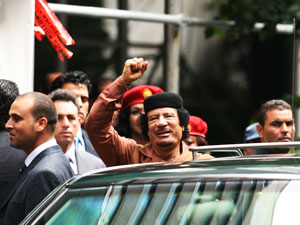
Muammar Gadhafi, Libyan leader and African Union president arrives in New York. Photo: Monica Morgan
The media's misrepresentation of Mr. Gadhafi's Sept. 23 United Nations speech, which was sharply critical of the 64-year-old organization shows a continued Western effort to keep him marginalized even as they court Libyan petroleum contracts. |
Muammar Gadhafi's first visit to the U.S. followed years of isolation and targeting by the U.S. government until the north African nation was able to come in out of the political cold through improved relations during the Bush administration.
The leader of the Socialist People's Libyan Arab Great Jamahiriya and chairman of the African Union, however, made poignant remarks and covered broad subjects—from abuses done by the Security Council to the need for greater respect for the rights of all nations, and demands that the assassinations of the Patrice Lumumba of Congo, U.S. President John F. Kennedy and Dr. Martin Luther King be reopened and investigated.
He also called for some $70 trillion in restitution for Africa based on the abuses of colonialism and the exploitation of the Motherland.
Speaking directly after President Obama, brother Leader Gadhafi spoke to the historical hypocrisy of the UN from its inception. Mr. Gadhafi gave a point by point outline of how the UN is controlled by a few large member states to the disenfranchisement of many smaller members.
Holding up a copy of the original UN charter and using the context of the document, Mr. Gadhafi criticized current inequities and discrimination of smaller nations by the U.S.; England; France; China; and Russia who occupy permanent seats on the UN Security Council. Libya was elected to a nonpermanent seat that rotates for a one year term ending in September 2010 and its Ambassador; Dr. Abdulsalaam Treki appointed head of the UN General Assembly.
“The Preamble says nations were equal, whether small or big,” said Mr. Gadhafi, referring to the charter.
“The veto power bestowed upon the five permanent members of the Security Council was, therefore, against the Charter.”
Continuing, he said the Charter's Preamble stated that military force should not be used unless there was a common interest.
Moreover, the Preamble said if there was aggression against any country, the UN would check such actions. Despite that, countries which held the veto were guilty of aggressive force against “the people,” even as the Charter said no nation had the right to intervene in the internal affairs of another.
“The Security Council is run for the wealthy European countries,” not to help the smaller nations but to “exploit” them, said Edward Manfredonia, a N.Y.-based journalist, who agreed with the Libyan leader's analysis.
However, the response to challenges for change and reform were received and reported differently by the media. While the news reports were positive for Barack Obama, they were everything but positive for Muammar Gadhafi.
The media's misrepresentation of Mr. Gadhafi's Sept. 23 United Nations speech, which was sharply critical of the 64-year-old organization shows a continued Western effort to keep him marginalized even as they court Libyan petroleum contracts.
After Mr. Gadhafi concluded his 90-minute speech, the disinformation campaign intensified, with an attempt to make mischief and mockery such as on the Sept. 24 cover of the N.Y. Daily News featuring a picture of Mr. Gadhafi and Iran's President Mahmoud Ahmadinejad with the words “Mad Men” and “crazy twins.”
Media demonizes Libyan leader?
Observers said this is the pattern of how unpopular leaders are handled by some in the Western press. Mr. Gadhafi was made to appear as the villain for disrupting the comfort zone of the imperialists who control the United Nations.
“He gets demonized,” said Mr. Manfredonia, adding “but you can be a despot, so long as you're pro-West, it's ok, and it's permissible.”
“They did not wish to deal with the substance of his wide ranging message,” said the Honorable Minister Louis Farrakhan, in a brief interview with The Final Call. Bro. Gadhafi talked about how the Security Council makes decisions against smaller nations, but never the big nations or their client states, said the leader of the Nation of Islam.
“The International Criminal Court makes decisions against leaders of smaller nations but they never bring charges against those with veto power and those under the protection of those with veto power. So he talked about the Security Council as a ‘terror council' that is terrorizing smaller nations into accepting to do what the Security Council says,” said Min. Farrakhan. He also felt Bro. Gadhafi's call for the General Assembly, which includes all UN member states, to act as the world legal body, or world parliament, with the Security Council executing the votes of the assembly was a good idea.
Bro. Gadhafi “talked about this body being set-up to avoid war but since this body was set-up to avoid war, 65 wars have taken place. And the preamble of the charter of the United Nations says that when one nation would be an aggressive nation that all of the Nations would act in concert against that nation to bring about peace and justice. But it should be in the interest of the whole United Nations when the membership of the United Nations decides to go to war,” he said.
The Minister said the Gadhafi speech should be studied, and plans are to publish the address in The Final Call newspaper. Readers and the American people “will not fall victim to the slander, the mockery of his way or style rather than deal with the substance of his message.
“If the United Nations General Assembly becomes the real power, the Security Council becomes the actor that acts on the will of the majority which Brother Gadhafi said is real democracy. Then the youngsters that are in these nations wouldn't be carted off to war to die in foreign lands—if there is a new arrangement other than the arrangement that presently guides the Security Council,” the Minister said.
“In the event that they do not do that, 53 Nations in Africa should have a permanent seat on the Security Council as the African Union,” he continued, supporting Col. Gadhafi's reform concept.
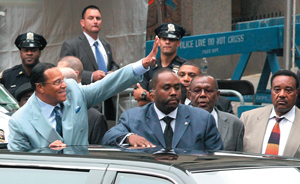
Min. Louis Farrakhan waves to crowd in New York, where he met with Brother Muammar Gadhafi. Photo: Lem Peterkin
|
“We welcomed him to America and we of course told him that we were there and whatever we could do to facilitate his first visit to the United States we were there for him,” said the Minister.
Libya has also been a friend to the Nation of Islam. Mr. Gadhafi loaned the Most Honorable Elijah Muhammad $3 million in 1972 to purchase a Greek orthodox church in Chicago. Mr. Muhammad converted the edifice into a mosque and Min. Farrakhan repurchased the property and it remains the national headquarters for the Nation of Islam.
During the 1980s, Mr. Gadhafi gave a $5 million loan to aid an N.O.I. initiative called P.O.W.E.R. (People Organized and Working for Economic Rebirth). At the height of U.S. aggression toward Libya, Min. Farrakhan was a major voice and force in a movement to demand the U.S. not attack Libya.
A warm welcome for Gadhafi
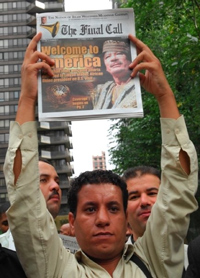
Libyan shows off copy of Final Call newspaper, which focused on the first U.S. visit by Libya's president. Photo: Richard Muhammad
|
Alsharif Omar, a Libyan student, told The Final Call, “The students insist to come here from various states because they love Col. Gadhafi. He has done a lot to change Libya from poor country to rich country and he has changed Libya completely. As I remembered, when I was born Libya was a piece of desert nothing in Libya but if you go now to Libya I'm sure you will be impressed by the change being done by Colonel Gadhafi.”
Fifteen-year-old Riahaan Habibullah was joined by two other youngsters in unfurling and holding a banner honoring Libya's leader. “We are here because we want to welcome Muammar Gadhafi to the States. He is really a good guy; he has done a lot of great things for the African countries and he's come here today and we just want to welcome him,” said young Habibullah, who was originally from Guyana.
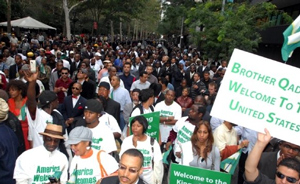
The crowd stretched for blocks and showed a different view of the Libyan leader's welcome as opposed to dominant view shown in U.S. media. Photo: Richard Muhammad
|
“My country is progressing every day. Now it is a very good situation; even before so, we are, my country is very wealthy because my leader is working hard to support us and we are interested to continue his stage of presidency. This is why we love him too much,” said Nouri Lafarnouk, a Libyan Ph.D. candidate studying Geographical Information Systems in America.
“We are day after day, we are nearest to him and we saw him and he works hard and he makes my country more progressive and the relationship now is very good between Libya and the other countries. You see now, even the United States has a good relationship now,” he observed. “I would like both sides to continue to build this good relationship. Because we are human beings, so we have to support each other. We owe it to each other because we have to learn from the involved countries, so this is my leader's work to learn and get the Libyans more advanced and get the technology because we are suffering a lot from the sanctions all around the world.”
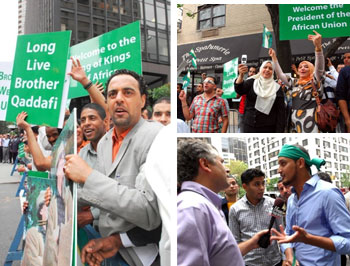
Demonstrators welcomed Col. Gadhafi outside the United Nations headquarters in New York, September 22, 2009. Photo Richard Muhammad
|
“When they make this (America) united everything is better and the life is progressive for the American land, for their life and for the economy and the life of the people is changed for the best. That's why we are going to make the United Africa States to improve our life on the African continent.”
Khalifa Elderbak, a Ph.D. candidate studying Geology, spent some time trying to make a point with a Fox News reporter, who insisted that Col. Gadhafi was a bad man. It didn't appear as though the reporter wanted to recognize the 40-year-old Libyan's point. “I think that the media is doing a very bad thing, they don't say the truth about what's going on outside the United States which is a shame. I don't say all the American media are doing the same thing, but most of the big media do that and they try not to let their people know the reality, the truth about other countries about the way they live.
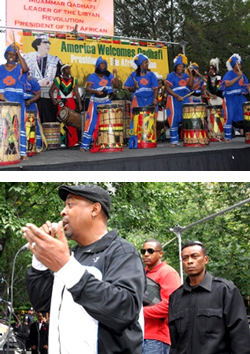
Chuck D, with mic, and Professor Griff of the rap group Public Enemy speak at rally. Photo: Richard Muhammad
|
“We never have had any problem with the West as a people. We had the problems with the government. And as I have said to Fox News that we have no problems with the people of the United States or with the people of Great Britain, our problem was the bosses of their governments. As I mentioned even their own people they don't like their bosses. It was like a decision made by some people in the United States government and Britain government to invade another country and kill hundreds of thousands of innocent people and that is what we don't like. We like justice, we believe in democracy, real democracy which is that democracy, that people should rule themselves without any representation,” he said.
Thousands of people turned out to welcome the Libyan leader when he arrived Sept. 22 and the next day, hundreds of members of the Nation's Fruit of Islam and along with Libyan students participated in a welcome program Dag Hammarskjold Plaza, where the leader's words and remarks of President Obama were beamed in and via satellite on a huge screen.
The program included African dancers and words of support from Akbar Muhammad and Student Minister Ishmael Muhammad, of the Nation of Islam, Chuck D and Professor Griff of the hip hop group Public Enemy and Native American leaders Ernie Longwalker and Warrior Woman.
Mr. Longwalker stressed his support for Col. Gadhafi's efforts to help oppressed and indigenous people. There is a need for the union of the Black and the Red and the oppressed, he said. Together these groups are the majority, he declared.
Confronting ‘imperial powers'
The media assault started with the “grounds of compassion” release of the Libyan national accused in the 1988 bombing of Pan-Am Flight 103, an American passenger plane, over Lockerbie, Scotland. Then there was the media circus around the placement of his tent at a Bedford, N.Y., property owned by businessman Donald Trump.
“This whole hoopla around the tent was beyond absurd,” said Bill Fletcher, executive editor of Black Commentator in a telephone interview with The Final Call.
“One does not have to agree with the release of the bomber in order to realize that one has to respect international dignitaries. The way the whole incident was handled was abysmal,” said Mr. Fletcher.
Some critics lambasted Mr. Gadhafi for exposing the inordinate strength of some nations compared to others within the world body. Others saw the speech as giving voice to the weaker nations who get exploited by members of the big five on the Council.
“The Security Council is dominated by Western powers, especially Western imperial powers,” said Mr. Manfredonia.
Absent from the “mainstream media” reporting of the speech was the chronological list of violations from Western powers in the “era of the United Nations” and Mr. Ghadafi's call to investigate these infringements.
Mr. Gadhafi praised the first Black president of the U.S. as a “son of Africa” but cautioned that no one can foresee the future of America after President Obama. The U.S. president was not in the Chamber Hall to hear Mr. Gadhafi's personal compliment and criticism of how the UN has conducted itself, driven largely by the influence of the U.S. agenda.
“Gadhafi, regardless of what people may think about him is a leader of a sovereign nation with whom the U.S. is redeveloping a relationship with,” said Mr. Fletcher.
Related news:
Web Video: Interview with Col. Muammar Gadhafi (FCN, 09-27-2009)
New York crowd welcomes Gadhafi to America (FCN, 09-23-2009)
FinalCall.com Special Coverage: The 2009 64th United Nations General Assembly
Welcome to America: Gadhafi at United Nations (FCN, 09-22-2009)
The Nation of Islam Welcomes Muammar Gadhafi (FCN, 09-22-2009)
INSIDE STORIES AND REVIEWS
-
-
About Harriett ... and the Negro Hollywood Road Show
By Rabiah Muhammad, Guest Columnist » Full Story -
Skepticism greets Jay-Z, NFL talk of inspiring change
By Bryan 18X Crawford and Richard B. Muhammad The Final Call Newspaper @TheFinalCall » Full Story -
The painful problem of Black girls and suicide
By Charlene Muhammad -National Correspondent- » Full Story -
Exploitation of Innocence - Report: Perceptions, policies hurting Black girls
By Charlene Muhammad -National Correspondent- » Full Story -
Big Ballin: Big ideas fuel a father’s Big Baller Brand and brash business sense
By Bryan Crawford -Contributing Writer- » Full Story






 Click Here Stay Connected!
Click Here Stay Connected!








